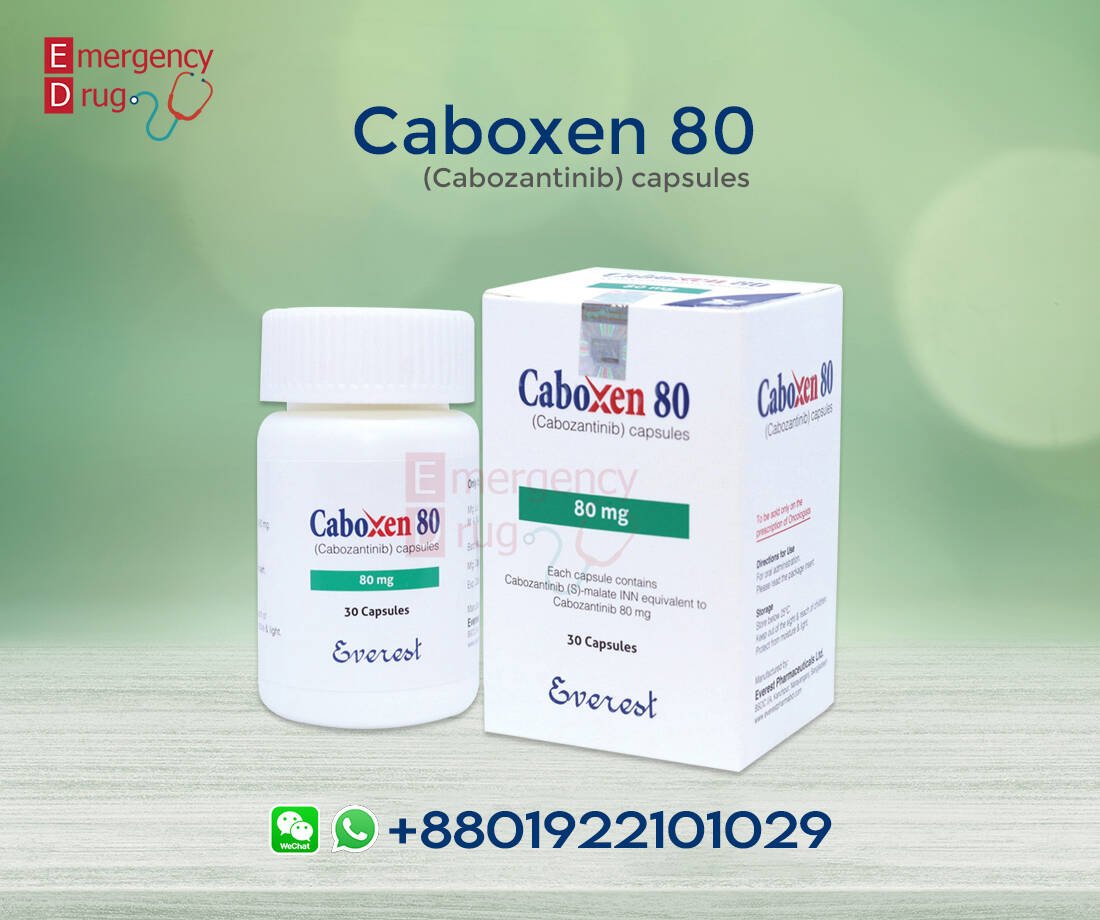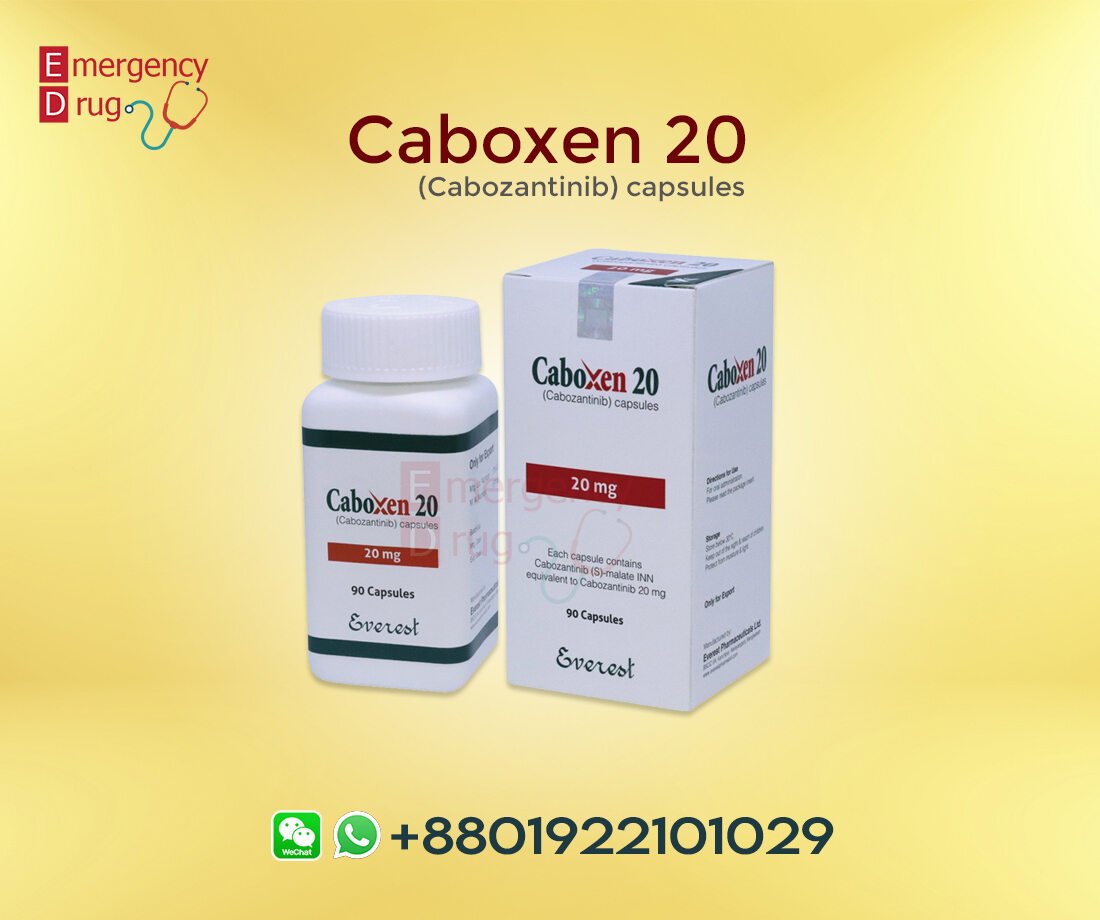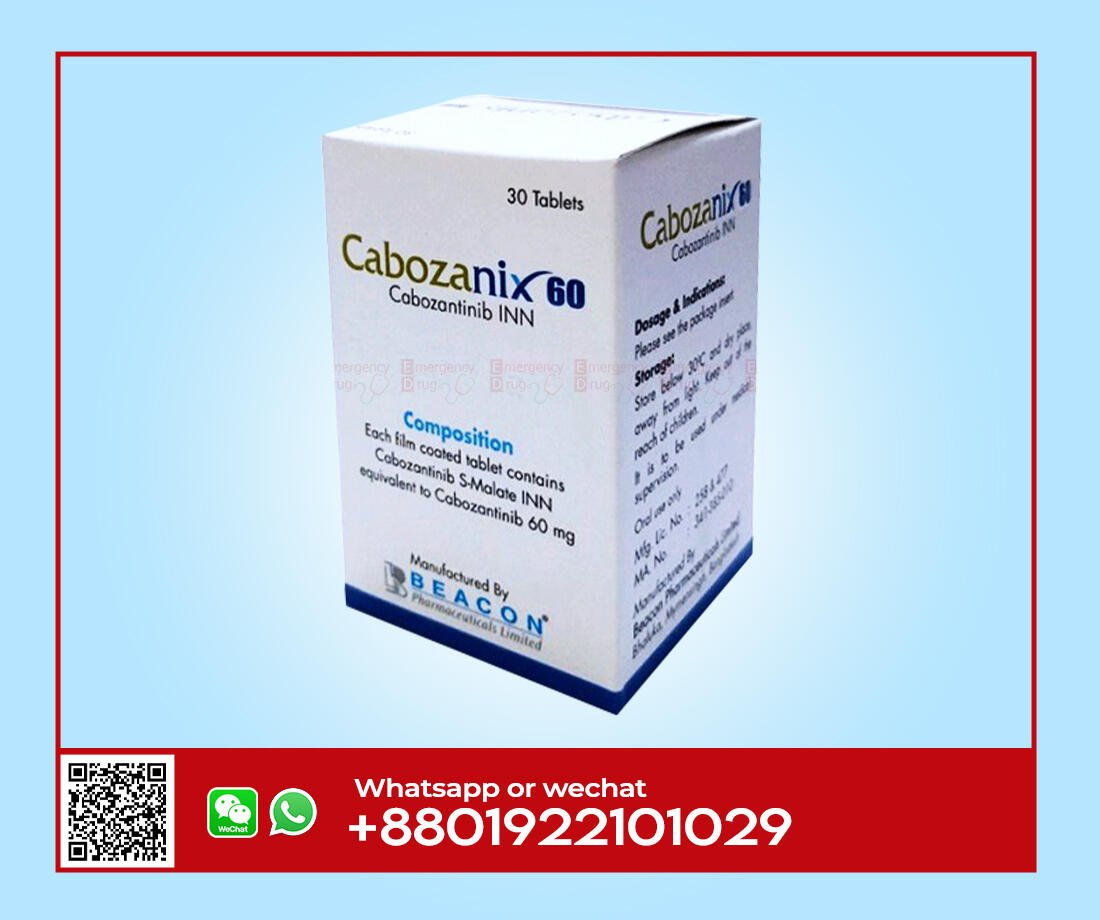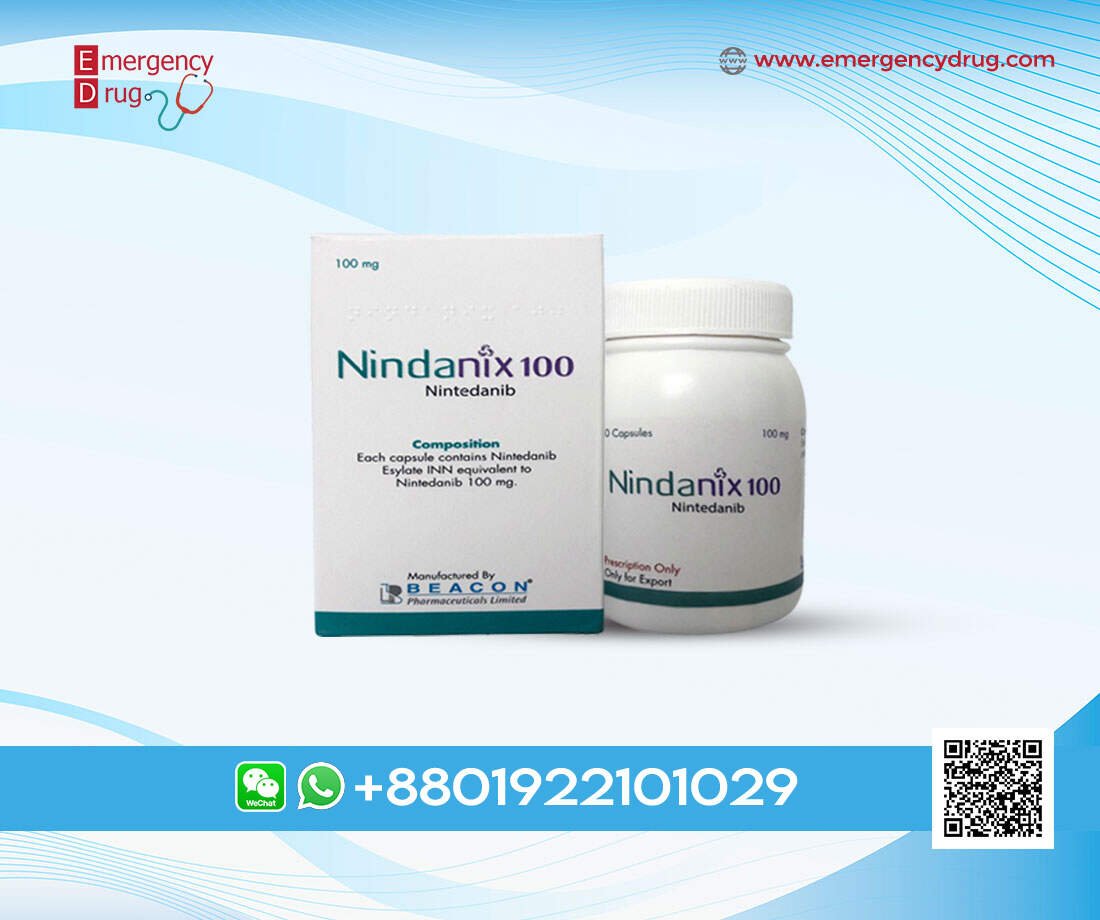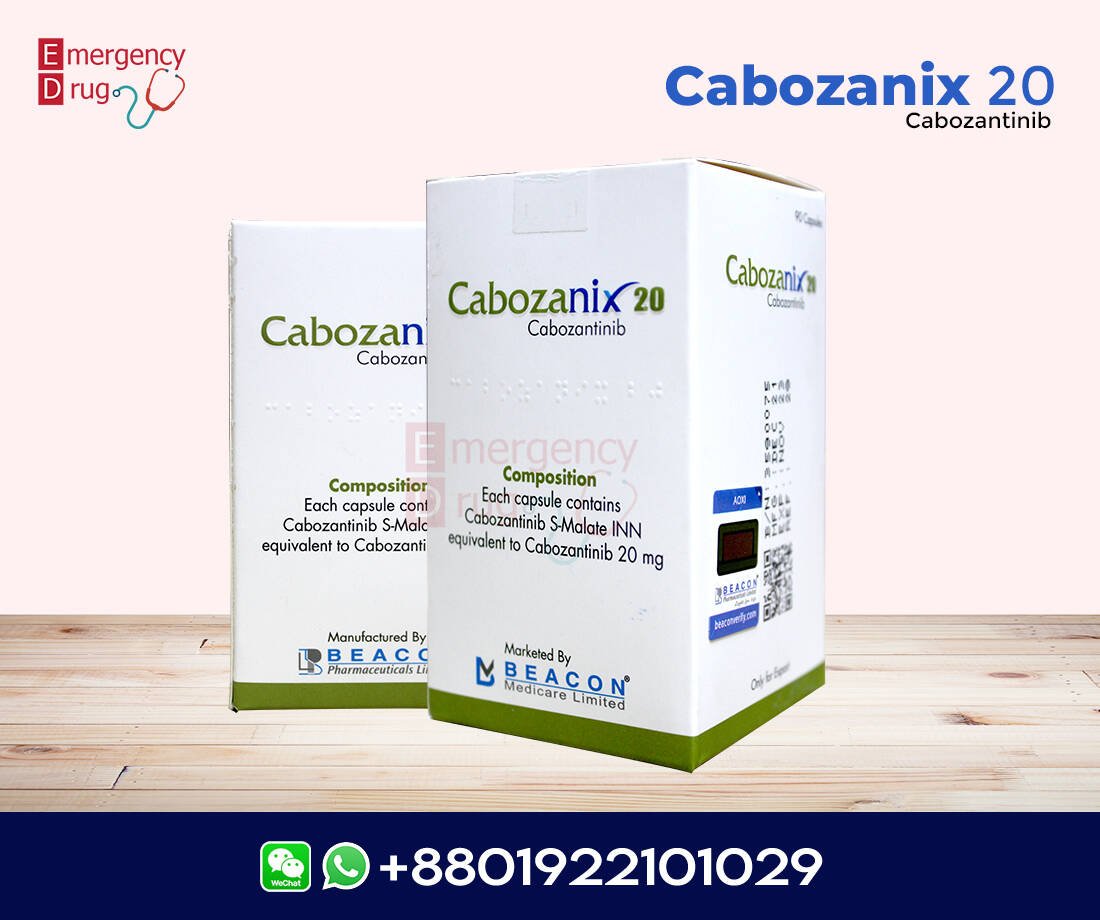
Cabozanix (Cabozantinib) 20 MG – 90 Capsules
Price: $810.00
Product Feature:
| Manufacturer | : Beacon Pharma Ltd. |
| Indication | : Thyroid cancer |
| Formulation | : Capsule |
| Strength | : 20 mg |
| Quantity | : 90 Capsules |
| Storage | : Below 30°C |
| Registrations | : Export Only |


Description
Indication
Cabozanix (Cabozantinib) use to treatment of advanced renal cell carcinoma (RCC; a type of cancer that begins in the cells of the kidneys). Cabozanix also use to treat hepatocellular carcinoma (HCC; a type of liver cancer) in people who were previously treat with sorafenib (Nexafar). Cabozanix is like a class of Tablets call kinase inhibitors. It blocks the action of an abnormal protein that signals cancer cells to multiply. This helps to prevent the spread of cancer cells.
Cabozanix (Cabozantinib) is available as a capsule to treat various types of thyroid cancer. This monograph only gives information about tablets for advanced RCC or HCC. This medication is for thyroid cancer; read the monograph entitled Cabozanix (thyroid cancer).
Using this Medicine
Cabozantinib comes as a tablet to take by mouth. It is usually taken once a day on an empty stomach, at least 1 hour before and 2 hours after eating. Take Capsule at around the same time every day. The length of your treatment depends on how well your body responds to the medication and the side effects you experience. Follow the directions on your prescription label carefully, and ask your doctor or pharmacist to explain any part you do not understand. Take Cabozanix exactly as directed. Do not take more or less of it or more often than your doctor prescribes it.
Your doctor may decrease your dose or permanently or temporarily stop your treatment if you experience serious side effects. Be sure to talk to your doctor about how you feel during your treatment with Cabozanix.
Precautions Before taking Cabozantinib
- Tell your doctor and pharmacist if you are allergic to Cabozanix, any other medications, or tablet ingredients. Ask your pharmacist or check the Medication Guide for a list of the ingredients.
- Ask your doctor and pharmacist what prescription and nonprescription medications, vitamins, and nutritional supplements you plan to take. So be sure to tell your doctor about all the medications you are taking, even those that do not appear on this list.
- Therefor you have recently had any unusual or severe bleeding such as coughing up blood, vomiting blood, or bloody or black tarry stools, if you have an open or healing wound, or if you have or have ever had high blood pressure, or liver disease.
- While you are pregnant or plan to become pregnant. You will need a pregnancy test before starting treatment with Cabozanix. You should not become pregnant during treatment and for 4 months after your final dose. Talk to your doctor about birth control methods you can use during your treatment. If you become pregnant while taking Cabozantinib, call your doctor immediately. Cabozanix may harm the fetus.
- If you are breastfeeding. Your doctor may tell you not to breastfeed during your treatment and for 4 months after your final dose.
- You should know that this medication may decrease fertility in men and women. Talk to your doctor about the risks of taking Cabozanix.
- You should know that your blood pressure may increase during your treatment with Cabozanix. Your doctor will probably monitor your blood pressure before and during your treatment.
Instructions should follow
Do not drink grapefruit juice or eat grapefruit or any foods or supplements containing grapefruit or grapefruit juice while taking this medication.
If you forget a dose
Take the missed dose as soon as you remember it. However, if it is less than 12 hours until your next scheduled dose, skip the missed dose and continue your regular dosing schedule. Do not take a double dose to make up for a missed one.
Side affects of this medicine
Cabozantinib may cause side effects. Tell your doctor if any of these symptoms are severe or do not go away:
- Constipation
- Nausea
- Redness, swelling, sores, or pain in your mouth
- Loss of appetite
- Weight loss
- Extreme tiredness or weakness
- Pale skin
- Pain in joints, arms, or legs
- Slowed wound healing
Serious side effects
Experience like any of these symptoms, call your doctor immediately or get emergency medical treatment:
- Chest pain, pressure, or tightness
- Coughing up blood or blood clots
- Vomiting material that is bloody or looks like coffee grounds
- Menstrual bleeding that is heavier than usual
- Red or black, tarry stool
- Diarrhea
- Unusual or heavy bleeding or bruising
- Tender or painful stomach area
- Warm, red, swollen, or tender arms or legs
- Swelling around eyes, arms, hands, legs, feet, or ankles
- Sudden headache
- Lightheadedness or fainting
- Numbness or weakness of the face, arm, or leg on one side of your body
- Sudden vision problems
- Sweating more than usual
- Jaw pain
- Toothache
- Swollen or painful gums
- Redness, pain, swelling or blistering on the palms or the soles
- Extreme tiredness, dizziness, fainting, weakness, nausea, or vomiting
- Yellowing of skin or eyes, extreme tiredness, bleeding or bruising easily, nausea or vomiting, right-sided-stomach pain, dark-colored urine, decreased appetite
Cabozantinib may cause other side effects. Call your doctor if you have any unusual problems while taking this medication.
Storage and Disposal Process
Keep this medication in the container it came in, tightly closed, and out of reach of children. Store it at room temperature and away from excess heat and moisture (not in the bathroom).
It is important to keep all medication out of sight and reach of children as many containers (such as weekly pill minders and those for eye drops, creams, patches, and inhalers) are not child-resistant and young children can open them easily. To protect young children from poisoning, always lock safety caps and immediately place the medication in a safe location.
Unneeded medications should be disposed of in special ways to ensure that pets, children, and other people cannot consume them. However, you should not flush this medication down the toilet. Instead, the best way to dispose of your medication is through a medicine take-back program. Talk to your pharmacist or contact your local garbage/recycling department to learn about take-back programs in your community.
Symptoms of Overdose
- Memory loss
- Confusion
- Weight loss
For more Oncology medicine, visit our SHOP

